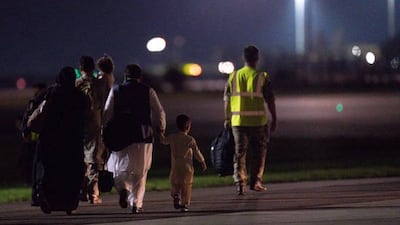Afghans who were airlifted to Britain after helping UK troops fight the Taliban will be offered permanent residency as part of a package nicknamed “Operation Warm Welcome”.
More than 8,000 Afghans will be able to apply for the permanent status immediately after arriving during the two-week airlift from Kabul. Most immigrants to the UK must wait five years for this.
Officials are trying to reach people who were left behind by the Nato airlift and help them leave Afghanistan, an operation described by ministers as “Dunkirk by WhatsApp”.
Those who made it to Britain - and the 2,000 people evacuated before the fall of Kabul - were taken to quarantine hotels while the government tries to find permanent housing.
The new arrivals will be offered English teaching to help them integrate, along with liaison officers who can help them find schools and doctors. The package includes extra school places and funding for university scholarships.
Ministers hope that Afghans will find jobs in the UK, and there are suggestions that some could join the British Army like the Gurkhas from Nepal.
Victoria Atkins, the minister in charge of resettlement, said more people would be brought to the UK. Officials were in contact with people who were still in Afghanistan and regarded as being vulnerable to the Taliban.
She said the operation had been dubbed “Dunkirk by WhatsApp” by Defence Secretary Ben Wallace, referring to the frantic Allied escape from a French beach during the Second World War.
“We are no longer now in Afghanistan, so we’re having to rethink very quickly how we can make this work,” she said. “I completely understand the urgency and the sensitivity for the people who are still in Afghanistan, but we are working at pace to try and find solutions in these very difficult circumstances that we’re now in.”
The permanent status gives Afghans “every opportunity to look to the future with stability and security,” said UK Home Secretary Priti Patel.
“We owe a great deal to the brave Afghans who worked alongside us and we want to make sure they have certainty and stability to be able to thrive.”
UK Prime Minister Boris Johnson said Britain had a “proud history of helping those in need”.
“We will prove that once again through our support for the Afghan people we’ve welcomed to the UK,” he said.
The offer applies to Afghans who worked with the British Armed Forces during their 20-year mission, for example as interpreters or security staff.
The scheme for those who helped the British military is separate from a five-year plan to admit 20,000 Afghans regarded as particularly vulnerable.
Ms Atkins, newly-appointed as Minister for Afghan Resettlement, did not confirm whether the permanent residency offer would be extended to new arrivals.
She said about 10,000 evacuees were staying in hotels as the government scrambles to find housing for Afghans once they complete quarantine.
“They have done right by us, we want to do right by them,” she told broadcasters. “It’s a huge task ahead of us, and we want to get it right.
“We’ve seen, over the last few days, how generous people have been. We want to very much take advantage and seize every opportunity of kindness that people are able to offer.”

Ms Atkins said the government was trying to extract people who could not reach Kabul airport before the August 31 deadline.
Britain has held talks with the Taliban in Qatar in the hope of securing safe passage for people left behind.
The government’s special representative for Afghan transition, Simon Gass, travelled to Doha to speak to Taliban representatives.
Like its European neighbours, Britain hopes to work with Afghanistan’s neighbours to help secure a way out for those in need.
UK Foreign Secretary Dominic Raab will face questioning from MPs at a parliamentary committee hearing on Afghanistan later on Wednesday.
Mr Raab has come under pressure over his whereabouts on a Greek holiday while Kabul fell. The opposition has called for his resignation.
The committee quizzing Mr Raab is chaired by Conservative MP Tom Tugendhat, a vocal critic of the withdrawal from Afghanistan.
“Leaving people defenceless in front of armed gangs is not how you end a war,” Mr Tugendhat said on Tuesday, “it's how you start a new one”.


